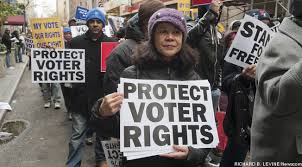
New Curbs on Voter Registration Could Hurt Obama and Undermine Democracy
By Deborah Charles
Progressive America Rising via Reuters
WASHINGTON (Reuters) - New state laws designed to fight voter fraud could reduce the number of Americans signing up to vote in this year's presidential election by hundreds of thousands, a potential problem for President Barack Obama's re-election bid.
Voting laws passed by Republican-led legislatures in a dozen states during the past year have sharply restricted voter-registration drives that typically target young, low-income, African-American and Hispanic voters - groups that have backed the Democratic president by wide margins.
A further 16 states are considering bills that would end voter registration on election days, impose a range of limits on groups that register voters and make it more difficult for people to sign up, according to the Brennan Center for Justice at New York University Law School.
The new laws - many of which include measures requiring voters to show a photo ID at the polls - could carve into Obama's potential support in Florida, Ohio and a few other politically divided states likely to be crucial in the November 6 election, analysts say.
The analysts note that massive registration drives in 2008 helped put millions of people aged 18 to 29 on voting rolls, and that age group - which makes up roughly one-quarter of the U.S. electorate - helped propel Obama to victory, voting 2-to-1 for him.
Rock the Vote, a nationwide organization that mobilizes young voters, said the new laws would make it more difficult for the group to educate people on how to sign up to vote.
"The types of laws have varied, but state by state they've added up to the fact that it's going to be harder for young people to get registered and vote in this election cycle," said Heather Smith, president of Rock the Vote.
"We have a very busy year ahead of us, and a very important one," she added. "What a shame if we can't continue to engage this generation in the political process because these laws have made it harder."
PROBLEMS WITH REGISTRATIONS
Rock the Vote, which registered a record 2.25 million young voters in 2008, has set a considerably lower target this year: 1.5 million. The group says the drop is because of the new laws as well as the fact that unlike 2008, this election year has had a competitive primary contest only among Republicans.
The League of Women Voters also could sign up fewer voters this year, partly because it has joined Rock the Vote in suspending voter registration drives in Florida as the groups challenge that state's new restrictions in court.
Another factor expected to drive down voter registration totals this year: the absence of the Association of Community Organizations for Reform Now, or ACORN, which registered more than 1 million mostly low-income voters in 2008.
Thousands of those registrations were for people who did not exist, submitted by ACORN-hired workers who were paid based on how many names they registered to vote.
The scandal helped lead to the demise of ACORN and inspire some of the anti-fraud laws affecting registration drives this year.
The episode involving ACORN, which folded in 2010 after it lost federal funding, showed a need for the new anti-fraud laws, said Brian Darling, a senior fellow for government studies at the conservative Heritage Foundation.
Like other conservatives, Darling rejected the notion that Republican-led legislatures had passed the laws to try to prevent certain groups from voting.
"There have been problems of voters being registered who weren't real voters," Darling said. "Just look at the ACORN scandal."
The new laws have led to a flurry of lawsuits across the country.
FLORIDA'S LAW DRAWS FIRE
The new anti-fraud election laws vary from state to state, but Florida's has received much attention largely because the state will be crucial in determining the winner of the November 6 presidential election.
Last May, Florida Governor Rick Scott, a Republican, signed a law that imposes tough new restrictions on third-party groups if they do not turn in voter registration forms quickly.
State legislators in Florida - the state at the center of the disputed 2000 presidential election won by Republican George W. Bush - said the law was aimed at preventing fraud and adding credibility to elections.
But the groups that try to register voters say the law - which requires the groups to register with the state and turn in voter forms within 48 hours of obtaining them or face at least $5,000 in fines - are onerous and discriminatory.
The law also cuts the number of days for early voting and no longer allows voting on the Sunday before Election Day. Some activists said that unfairly targeted blacks and Hispanics, who went to the polls in large numbers the Sunday before Election Day in 2008 through programs called "Pews to the Polls" and "Souls to the Polls.
In Ohio, another crucial state in the election, the Obama campaign has asked supporters to rally against a proposal to curtail early voting, arguing weekend polling hours allow many workers more of a chance to vote.
COMPLICATIONS IN WISCONSIN
Other states' voting laws complicate things for groups seeking to register voters.
In Wisconsin, new laws require licensing for anyone who registers someone else to vote, and the rules for licensing vary in the state's 1,800 municipalities.
That could mean a volunteer for a voting drive in a school district would have to take a course and get licensed in a dozen different municipalities in that one school district, said Jeannette Senecal, director of elections for the League of Women Voters.
Senecal called Florida's law the most "extreme" of the new regulations. She said the impact was already being felt across the state, with about 81,000 fewer voters registered this year than at the same time in 2008.
"Since they're making it more difficult for organizations like ourselves to participate in the process," Senecal said, "it does cut back on the amount of opportunity that we have to register these unregistered voters."
Senior Obama campaign officials would not comment. But in some states, the campaign began its own voter registration efforts earlier than it did in 2008, to try to make up for the impact of the new laws.
The Heritage Foundation's Darling said Democrats and voter registration groups were overplaying the impact of the new laws.
"Voter registration drives are great and all that, but it's not the end-all and be-all of voting," he said. "If (people are)going to vote, they should take the initiative to go register themselves."
(Additional reporting by Eric Johnson in Chicago; Editing by David Lindsey and Peter Cooney)
Read More...
Summary only...



 A new Pew Research Center study suggests this pattern may well continue in 2012. Millennial voters are inclined to back President Barack Obama by a wide margin in a potential matchup against former Massachusetts Governor Mitt Romney, while Silent generation voters are solidly behind Romney. Baby Boomers and Generation X voters, who are the most anxious about the uncertain economic times, are on the fence about a second term for Obama.
A new Pew Research Center study suggests this pattern may well continue in 2012. Millennial voters are inclined to back President Barack Obama by a wide margin in a potential matchup against former Massachusetts Governor Mitt Romney, while Silent generation voters are solidly behind Romney. Baby Boomers and Generation X voters, who are the most anxious about the uncertain economic times, are on the fence about a second term for Obama.







![[PDA - Heathcare NOT Warfare - Sign the Petition.]](http://pdamerica.org/images/ads/HealthNotWar_final.jpg)


